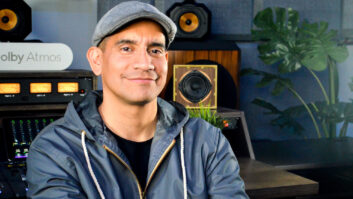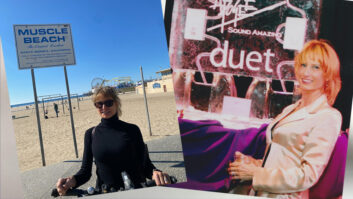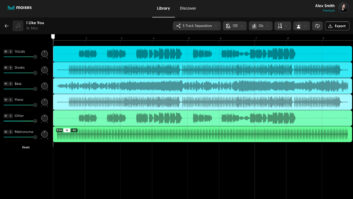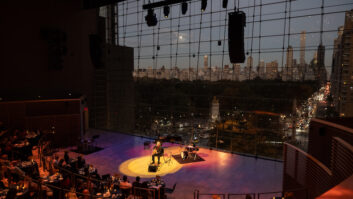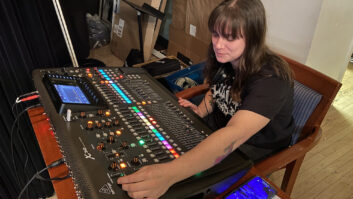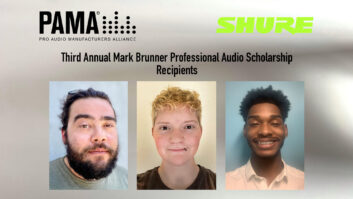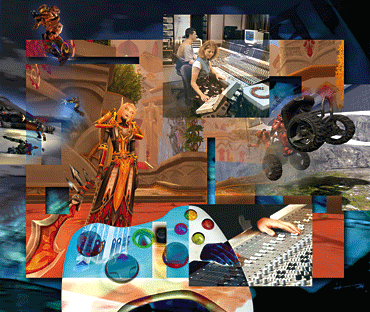
There are a lot of audio education programs out there, from weeklong studio classes to Master’s programs. From Berklee College of Music to Musicians Institute, you can find recording programs that can teach you everything you want to learn about high-end audio tools, but only a precious few schools devote time to game audio.
Why is it important to understand the difference between film and games? It’s easy to dismiss the difference with the simple notion that “games are nonlinear,” but it’s much more complex than that. Let me quickly give you an example: After I finish writing this column, I am going to implement a weapon-“firing” sound for a game that Obsidian is developing. The engine we are using currently does not attach the firing sound as a single loop, but as a single file that is triggered each time the weapon actually fires. The difference between a linear sound that’s timed perfectly to what is taking place onscreen vs. multiple files triggering together is surprisingly large. Refire rate, reverb, pitch and volume modulation all come into play on a real-time basis. It is this kind of information that students need to digest to compete in the game audio industry, and, at last, audio schools are taking it seriously.
HOT CLASSES
The Conservatory of Recording Arts and Sciences in Arizona has started something really special: the first audio integration course with certification in Audiokinetic’s Wwise application, one of the most widely used audio middleware apps.
Director of education (and Mix technical editor) Kevin Becka explains that the school starts and finishes a new course every three weeks. Because each student enrolled at the Conservatory goes through the game, more than 800 students a year become familiar with Wwise and game audio integration concepts.
“We’re in the process right now of developing a [Version] 2007.2 Certification in collaboration with Audiokinetic,” says Becka. “Each student would then be manufacturer-certified as an operator. We will also offer this on the corporate level to game producers wanting to quickly get up to speed on the app. We can train locally or travel with computers and an instructor.”
In addition to the game audio segment, students learn all the audio skills they’ll need to use as third-party content providers and integrators, such as operation of Pro Tools, Logic Studio and Reason, along with advanced recording and mixing skills.
This is a huge step forward, but how successful has it been? CRAS has placed students at Volition Inc., Rainbow, Pure Audio, Midway, 2XL Games and GenAudio. “We’re attracting more and more students interested in game audio now that we have the Wwise curriculum in place,” says Becka. “We also had a booth at the Game Developers Conference for the first time last year. We were on the show floor and got some very good leads and interest generated from that.”
There are other institutions that have game audio integration goals in mind. David Javelosa is a digital audio instructor at Santa Monica College in Santa Monica, Calif. He started a course titled “Digital Audio for Games” in the fall of 2004 as part of an overall certificate program in game development, and the class is still going strong in 2007. “Our headcount is increasing toward us offering the class every semester. We also teach a summer game program for high school to load the regular semester,” he says.”
Javelosa, having been an audio director at Sega until 1994, also adds a much-needed historical perspective in his class. “The students are happy with the studies in ‘old-school’ platform development: cartridges, MIDI, downsampling, proprietary tools and more. They also embrace techniques in our current audio tools. We offer the Sony Suite in the class: Sound Forge, Vegas, ACID. But there is strong interest in real-time interactive implementation. I use a template in Game Maker [a freeware game engine developed by YoYo games] for them to drop their audio into and actually ‘play’ the game audio.”
GETTING WITH THE PROGRAM
In addition to courses being taught at UCLA Extension and USC, audio schools are making plans to offer even bigger courses beyond certification and single classes. Paul Lipson, dean of Academic Affairs at Ex’pression College for Digital Arts in Emeryville, Calif., is developing a full-scale Bachelor’s degree program in Game Audio.
“Ex’pression takes game audio very seriously, and our Sound Arts program has blazed a trail for undergraduate courses of study,” says Lipson. “Our Program Partnership with the Game Audio Network Guild [G.A.N.G] has enabled us to bring in a constant stream of industry professionals for master classes, panels, demo derbies, curriculum review sessions and advisory committee meetings — all of which have contributed positively to our program. We have also been successful in creating a unique post-production environment, as all of our visual media students are often in need of audio assets and content. There is a natural synergy when our audio students work closely with other departments, and we feel that opportunities for asset implementation provide for a deeper experience beyond pure content creation.”
Ex’pression offers specific game audio courses, along with MIDI and digital audio workstation courses that deal with content creation, post-production, implementation and adaptive audio techniques. “We have students scoring interactive projects, as well as using version-management systems to track assets for implementation into professional game engines.”
The school has two game audio scholarship programs: “Ex’pression offers two $10,000 scholarships for G.A.N.G. members for game audio studies, and we announce the winners at the G.A.N.G. awards ceremony held at the Game Developers Conference,” says Lipson. “We are entering our third year of offering specific game audio scholarships, and the response has been inspiring.”
Full Sail also is jumping aboard the game audio education bandwagon. As reported by Bill Smith, head of Full Sail’s Recording Arts program: “Each year, the number of Full Sail Recording Arts graduates entering the gaming industry doubles. There is clearly a demand for competent, qualified people and we’re doing everything we can to prepare our grads to take advantage of the opportunity. Our Multimedia Audio, Digital Audio Workstations, and Audio Post-Production courses all contain game-audio related content using the most common tools in the gaming industry. Our Recording Arts grads also have the opportunity to gain practical experience by working as with our Game Design and Development program as their audio team.
“Full Sail does its best to garner feedback from the industry and from our grads working in the field to determine how our programs should evolve,” Smith continues. “To that end, we plan to incorporate more emphasis on implementation, coding, and file management in the coming months.”
Game audio education is a discipline whose time has arrived, and these schools are leading the pack on developing and exposing curriculums. More schools are developing courses as we write this; keep your eye on this space for developments.
Alex Brandon is the audio director at Obsidian Entertainment.
